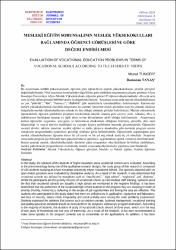Mesleki eğitim sorunsalının meslek yüksekokulları bağlamında öğrenci görüşlerine göre değerlendirilmesi
Künye
Tuncer, M. ve Tanaş, R. (2019). "MESLEKİ EĞİTİM SORUNSALININ MESLEK YÜKSEKOKULLARI BAĞLAMINDA ÖĞRENCİ GÖRÜŞLERİNE GÖRE DEĞERLENDİRİLMESİ", elektronik eğitim bilimleri dergisi, c.8 sayı.15. s.76-88 -ISSN:1302-7905Özet
Bu araştırmada meslek yüksekokulunda öğrenim göre öğrencilerin meslek yüksekokullarına yönelik görüşleri
değerlendirilmiştir. Nitel araştırma desenlerinden olgu bilime göre yürütülen araştırmanın çalışma grubunu Afyon
Kocatepe Üniversitesi Afyon Meslek Yüksekokulunda öğrenim gören 135 öğrenci oluşturmaktadır. Altı açık uçlu
soru ile elde edilen görüşler betimsel analiz ile değerlendirilmiştir. Araştırma sonucunda meslek yüksekokullarının
en çok “yetersiz”, “lise”, “bakımsız”, “diploma” gibi metaforlarla tanımlandıkları belirlenmiştir. Katılımcılar
meslek yüksekokullarının öncelikli misyonunu ara eleman yetiştirme olarak görmekte iken bu yöndeki olumsuz
bulgularda meslek yüksekokullarının aslında bir lise olduğu yönünde görüşler belirtilmiştir. Meslek yüksekokulu
öğrencilerinin öğrenim gördükleri programı tercihlerinde öncelik sırasına göre çevresi (Aile, Arkadaş, vb.), iş
imkânlarının fazlalığına inanma ve ilgili alanı sevme durumlarının etkili olduğu belirlenmiştir. Araştırmaya
katılan öğrenciler uygulama, araç-gereç ve laboratuvar eksiklerinin olduğunu belirtmiş, güvenlik, ders saati
düzensizliği ve sosyal aktivite eksikliğini ise yaşanan başlıca problemler arasında göstermişlerdir. Öğrenciler
seçmeli dersler, işletme yönetimi, meslek eğitimi ve kalite güvence standartları gibi derslerin program ayrımı
olmaksızın programlardan çıkarılması gerektiği yönünde görüş belirtmişlerdir. Öğrencilerin çoğunluğuna göre
meslek yüksekokullarının öğrenim süresi iki yıl teorik ve bir yıl staj olmak üzere üç yıl olmalıdır. Araştırma
sonucunda program içeriklerinde bazı güncellemelerin yapılması, uygulamalara ağırlık verilmesi önerilmektedir.
Bunun yanında meslek yüksekokullarındaki derslerin yakın programları olan fakülteler ile birlikte yürütülmesi,
meslek yüksekokulu programlarının enstitülerde temsili konusunda düzenlemeler yapılması önerilmektedir. In this study, the opinions of the students of higher education about vocational schools were evaluated. According
to the phenomenology being one of the qualitative research designs, the study group of this research is composed
of 135 students studying at Afyon Kocatepe University Afyon Vocational School. The opinions obtained with six
open-ended questions were evaluated by descriptive analysis. As a result of the research, it was determined that
vocational schools are defined by metaphors such as “insufficient”,” high school”, “neglected” and” diploma”.
While the participants see the priority mission of vocational schools as intermediate staff training, opinions about
the fact that vocational schools are actually a high school are mentioned in the negative findings. It has been
determined that the preference of the vocational high school students in the program they are studying in order of
priority (Family, Friend etc.), believing in the excess of job opportunities and loving the area are effective. The
students who participated in the study stated that there are deficiencies in application, equipment and laboratory,
and lack of security, lesson clock irregularity and social activity were among the main problems experienced.
Students expressed the opinions that courses such as elective courses, business management, vocational training
and quality assurance standards should be removed from the programs without any program distinction. According
to the majority of students, the duration of study of vocational schools should be three years, which is in the way
of two years of theoretical and one year of internship. As a result of the research, it has been recommended to
make some updates in the program contents and to concentrate on the applications. In addition, it has been proposed to carry out the courses in the vocational schools together with the faculties which are close programs,
and to make arrangements on the representation of the vocational school programs in the institutes.
Cilt
8Sayı
15Koleksiyonlar
- Makaleler [69]



















